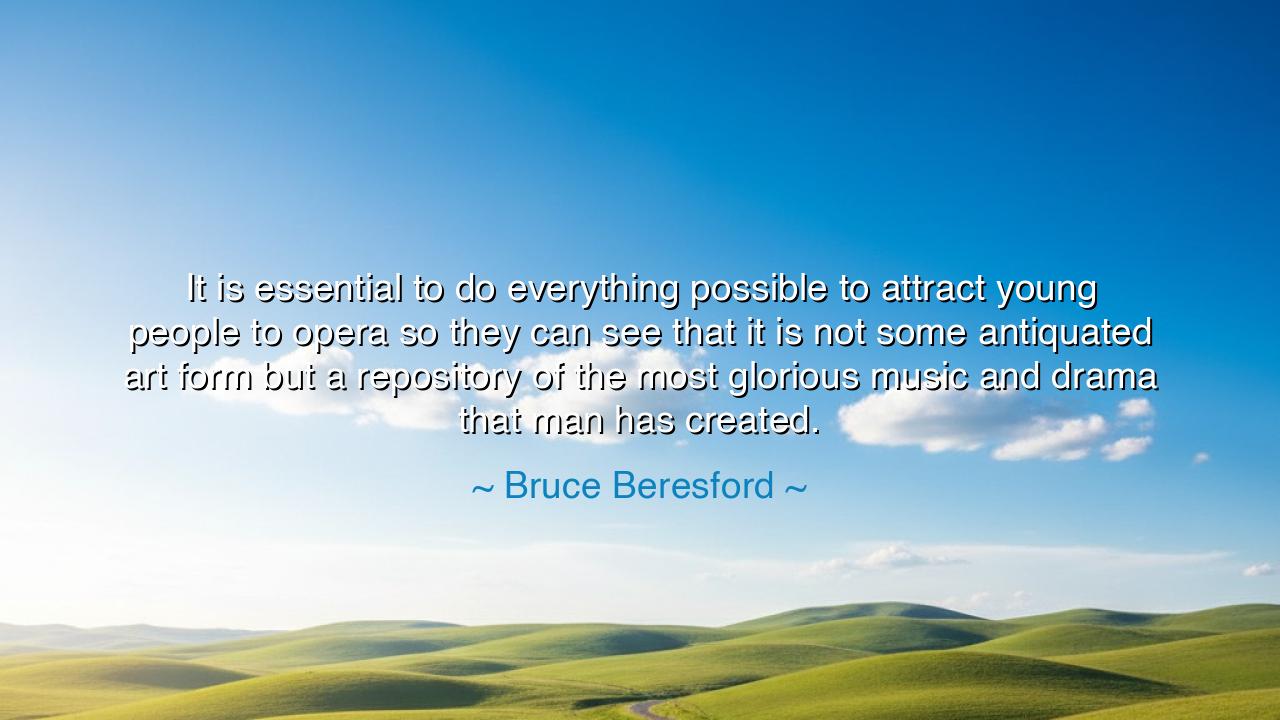
It is essential to do everything possible to attract young
It is essential to do everything possible to attract young people to opera so they can see that it is not some antiquated art form but a repository of the most glorious music and drama that man has created.






Bruce Beresford, the master storyteller of stage and screen, once declared with clarity and urgency: “It is essential to do everything possible to attract young people to opera so they can see that it is not some antiquated art form but a repository of the most glorious music and drama that man has created.” In this statement lies both a warning and a plea. He speaks not only of opera, but of all treasures of culture that risk being forgotten, unless the flame is passed on to the next generation.
To call opera “a repository of the most glorious music and drama” is to recognize it as a vessel of humanity’s deepest emotions and highest artistry. Opera was born in the courts of Renaissance Italy, where music, poetry, and theater merged into a single expression of the human soul. Within its soaring arias and thunderous choruses are love and betrayal, triumph and tragedy, laughter and despair. It is not antiquated—it is eternal, for the passions it conveys are the same that beat in human hearts today.
Yet Beresford warns us that without the young, even the most glorious treasures grow silent. Each generation must be awakened to the beauty of opera, lest it be dismissed as a relic of the past. For too often, the youth are told that opera is distant, outdated, or inaccessible, when in truth it is a mirror of their own struggles and desires, clothed in music of unparalleled grandeur. The challenge, then, is not in opera’s power, but in our failure to reveal it to new eyes and ears.
History offers us lessons. Consider how Richard Wagner sought to renew opera in the 19th century. He believed that the art form must not only entertain but transform, blending myth, poetry, music, and stagecraft into what he called the Gesamtkunstwerk—a “total work of art.” His operas were not museum pieces, but living dramas that shook audiences to their core. Wagner proved that opera, when presented with vision and courage, speaks to every age with undiminished power.
Even in modern times, this truth resounds. When Luciano Pavarotti sang for massive outdoor audiences, he brought opera from gilded halls into the public square. The youth, who may never have entered an opera house, were stirred to awe by the raw power of the human voice. In such moments, the boundary between “antiquated art” and living truth dissolved. This is what Beresford calls us to remember: opera survives only when it continues to touch living souls.
The lesson, then, is profound: do not let the treasures of the past be buried under the dust of neglect. Introduce the young to greatness. Give them opera, symphonies, poetry, and drama—not as lifeless relics, but as living flames. Show them that art is not for the old, but for all who breathe, love, and dream. For the soul of a culture endures only when its masterpieces are received anew by each generation.
So, O children of tomorrow, take this charge to heart. If you are young, do not dismiss what came before you—explore it, and you will find your own spirit reflected there. If you are older, share these treasures with the next generation, not with scolding, but with joy and wonder. For opera—and all great art—is not merely about the past; it is about what it awakens in the present.
Thus remember always: art does not age, only our reverence for it does. Opera is not antiquated—it is eternal. It waits only for open ears and open hearts. As Beresford reminds us, it is essential that we do everything possible to preserve this living glory, so that humanity may continue to be lifted by the music and drama that reveal the very essence of our souls.






AAdministratorAdministrator
Welcome, honored guests. Please leave a comment, we will respond soon